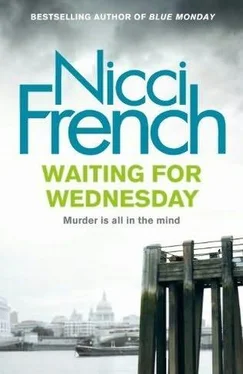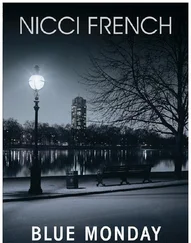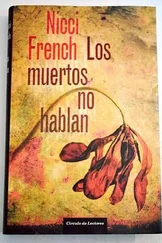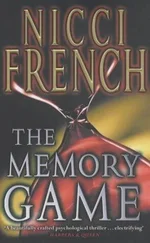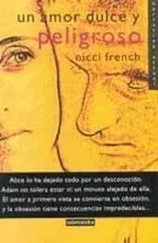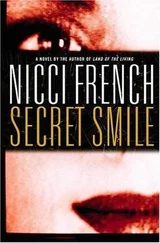‘Call for help,’ said Frieda to Josef.
Josef took out his phone.
‘Upstairs for signal,’ he said.
‘Nine, nine, nine,’ said Frieda.
‘I know it,’ said Josef.
Frieda looked into the woman’s face. ‘Sharon?’ There was another whimper. ‘I’m going to pull the tape off. You’ll be fine but keep quiet. Gerry has gone out but we have to move.’ Another whimper. ‘You’ll be all right. But this will sting.’ Frieda got some purchase on the tape and pulled it off. The skin underneath was pale and raw and smelt of decay. Sharon whimpered like an animal. ‘It’s all right,’ said Frieda, soothingly. ‘I told you. He’s gone.’
‘No,’ said Sharon, shaking her head. ‘Other man.’
‘Fuck!’ Frieda turned round and started to run up the stairs. ‘Josef.’
As she ran she heard a clattering and banging, like furniture falling downstairs, and as she emerged from the cellar door she saw shapes moving and heard shouts. She couldn’t make anything out clearly and her foot slipped. The floor was wet, sticky. Then there was a mess of impressions: the figures moving and flexing, flashes of metal, cries, splashes, bangs, impacts so that the floor shook under her feet. Her focus became narrow, as if she was looking at the world through a long thin tube. Her thoughts became narrow as well. They seemed slow and time seemed slow and she knew that she must not collapse because then it would all have been for nothing. She found something in her hand – she didn’t know what it was or how it got there, but it was heavy and she was hitting with it, as hard as she possibly could, and then the scene became clearer, as if the light had gradually been turned up. Lawrence Dawes was lying face down on the hall floor and a dark red pool was spreading out from him, and Josef was leaning back against the wall, panting and groaning, and Frieda herself was leaning against the wall opposite and she realized that the wet sticky stuff on her hands and clothes was blood.
‘Frieda? Frieda, Frieda .’ Josef seemed to have lost his English; her name was all that he could say, over and over.
Frieda crossed to him. She felt suddenly clear and light and calm, a sense of purpose and energy coursing through her. She saw that he had a violent gash running down his face and neck and one of his arms was hanging in an odd way. His face was horribly pale under the grime.
‘It’s all right, Josef,’ she said. ‘Thank you, my very dear friend.’
Then she stooped down beside Lawrence Dawes. There was a matted red patch on his head where she had hit him but she could see that he was breathing. She looked at the heavy object she was still holding: it was one of Josef’s heavy spanners, which must have tumbled from his bag, and it had red smeared across it.
‘Take this,’ she said to Josef. ‘If he comes round, hit him again. I’ll be back in a minute.’
She ran into the kitchen and started pulling drawers open. Gerry Collier was a very organised man: everything had its proper place. She found a drawer full of string, masking tape, pens, and took out a roll of washing line. That would do. She returned to the two men and, bending down, brought Lawrence Dawes’s hands together and rapidly bound the line round them multiple times, before bringing it down and wrapping it round his ankles as well, until he was trussed.
She pulled her phone out of her pocket with fingers that were not trembling, and dialled the emergency services. She said she needed the police, lots of them, and ambulances and gave the address, repeating it to make sure they had it. She gave her name, and heard it as if it belonged to someone else. She told them they should be quick. Then she put her phone back into her pocket. She could hear Josef’s laboured breathing beside her and, turning, saw the pain on his drawn face. She took the spanner out of his hand and touched him lightly on the shoulder.
‘Wait there for one more minute,’ she said, and kissed him on his clammy forehead.
She ran down the cellar stairs. At the bottom, she stopped briefly to put two thumbs on Fearby’s lids, closing them. She smoothed his hair off his face, then went to where Sharon Gibbs was still on her knees, her head cradled on her arms. She was making guttural little cries, like those of an animal in pain. She was wearing a bra that barely covered her shallow breasts and some filthy drawstring trousers; her feet were bare and torn. Frieda could see in the dim light that she was covered with bruises and what looked like cigarette burns.
She squatted beside her and put a hand under her elbow. ‘Can you get up?’ she asked. ‘Let me help. Here.’ She took off her jacket and wrapped it around the girl’s emaciated frame. Her ribs stood out starkly, and her collarbone. She smelt of rot and decay. ‘Come with me, Sharon,’ Frieda said gently. ‘It’s over, and you’re safe. Come out of here.’
She half led and half carried the girl, past Fearby and up out of the cellar that had been her torture chamber, into the light that was fading now. Sharon gave a little cry of pain at the dazzle and bent over, almost falling, coughing up dribbles of vomit. Frieda got her to the doorway, out of the accursed house and into the clean air, and sat her on the steps.
Josef shambled over. Frieda took off her cotton scarf and wrapped it around his neck, where blood was running thickly. He made to sit on the step, but Sharon shrank from him.
‘It’s OK,’ Frieda said. ‘This man is good. He rescued you, Sharon. We both owe him our life.’
‘I was coming to find Lila,’ Sharon whimpered. ‘I wanted to see Lila.’
‘It’s all right now. Don’t talk yet.’
‘Is she dead?’
‘Yes. I’m certain she is. She must have found out about her father so he killed her. But you are alive, Sharon, and you’re safe now.’
She stood beside the two of them. There was the smell of honeysuckle wafting over to them from the neighbouring garden, and three doors down Frieda could see the old woman watering her tiny front garden with a hose. It was a beautiful late-spring evening. She fixed her eyes on the road – looking not just for the flashing blue lights of the police and the ambulances, but also for the figure of Gerry Collier. It was only minutes since she and Josef had watched him leave, but it seemed like hours, days – another world. Behind them, the door was wrenched off its hinges, and in the cellar lay Jim Fearby, his long task over.
At last they came, sirens and lights shattering the soft evening. She heard them before she saw them, blue arcs swinging over the street before the cars and ambulances arrived, a screech of brakes, a sudden rush of men and women, voices speaking urgently, orders and exclamations, people bending towards them, stretchers, oxygen masks. Neighbours gathering on the road, a sudden sense of being at the centre of a world closing in on them.
There was a man standing in front of her, asking her something. She couldn’t make out his questions but she knew what she had to say.
‘My name is Frieda Klein.’ She heard her voice, calm and clear. ‘I made the call. This is Josef, who is hurt. And Sharon Gibbs, who has been missing for weeks. She has been held in the cellar by the man tied up inside, Lawrence Dawes. Be careful with her. You can’t know what she’s been through. A second man is at large, Gerry Collier. You have to find him.’
‘Gerry Collier, you say?’
‘Yes. He owns this place. And a man called Jim Fearby is dead, inside the house. You’re too late for him.’
Faces hovered above her, blurred, anonymous, mouths opening and stretching, eyes large and staring. Someone was saying something, but she pressed on.
‘There will be bodies in the garden.’ She could no longer tell if she was speaking quietly or shouting, as if from a pulpit. ‘Or bodies in the cellar.’
Читать дальше
